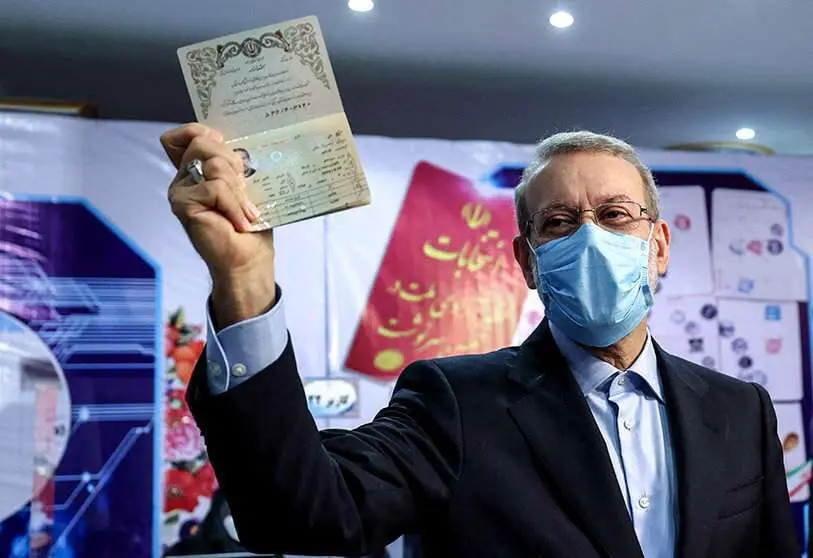The closed circle of the power struggle in Iran over the presidency

With Ali Larijani entering the Iranian presidential election campaign, the show took on a new flow that may disrupt Khamenei's pre-orchestrated election. On the one hand, he had removed the forein minister Javad Zarif from competition by having released the audio file of his internal speeches; on the other, he had advised Hassan Khomeini, the grandson of Ruhollah Khomeini, not to participate in the elections and had, in an unprecedented manner, made 220 members of parliament want Ibrahim Ra'isi to run for office. Khamenei clearly has the intention to have Ra’isi come out of the ballot box.
Khamenei had to inevitably accept Hassan Rouhani as president in the last election 4 years ago for the fear of another uprising because people hated Ra’isi for the massacre of 30,000 political prisoners in 1988 - most of whom being members and supporters of the Mojahedin Khalq Organization (MEK) – and called him Ayatollah Death. Two years later, Khamenei, in a consolation to Ra’isi, appointed him as head of the judiciary replacing Sadegh Larijani, Ali Larijani's brother. And in his Nowruz speech, emphasizing fear of what happened during the 2009 elections, Khamenei stressed that the elections should not be bipolar; albeit, both poles are under the jurisdiction of Velayat-e-Faqih.
It should be noted that in 2009 there was a rift between the two so-called reformist factions, led by former Prime Minister Mir Hossein Mousavi and Parliament Speaker Mehdi Karroubi on the one hand, and the Conservative faction led by Ahmadinejad on the other. Due to the widespread fraud carried out on Khamenei's orders to conjure Ahmadinejad out of the ballot box, the people revolted against Khamenei's decision and the appointment of President Ahmadinejad, and in a short time there were widespread demonstrations all over Iran. Khamenei was forced to kill and arrest his opponents extensively in order to quell the uprising, and to put Mir Hossein Mousavi and Karroubi under house arrest, who were not freed after 12 years. Interestingly, Ahmadinejad also angered Khamenei during the last two years of his presidency in a power struggle and was attacked by Khamenei's faction.
This year, Ahmadinejad, too, has registered to run in the election, but because he knows that Khamenei's appointed Guardian Council will most likely disqualify him and not allow him to run in the election, he has threatened that if the Council disqualify him, he will boycott the election and will somehow tell his supporters not to vote.
It is noteworthy that the majority of Iranians have announced that they will not participate in the election and have boycotted it. And it is predicted that this time around there will be the lowest turnout in the last 42 years. This election will, therefore, make the illegitimacy of Khamenei's government more and more obvious. For this reason, Khamenei and all his Friday prayers have declared that participating in the elections is a national and religious duty and the solution to all the people's problems, and any kind of election boycott will be considered hostility towards the system.
Ali Larijani, a former commander of the Revolutionary Guards (IRGC) has registered to run for the election as well. He was the speaker of the parliament for 10 years, during which time he expressed his allegiance to Khamenei many times. He also showed that his only goal was to suppress and loot the Iranian people through the regime parliament. Recently, he played an important role in the infamous 25-year sale contract of Iran to China. He and his three brothers have a large part of Iran’s financial resources under their control through theft and plunder. Now that Khamenei’s death is imminent, they do not want to step out of power circle and hand over power to Khamenei's entourage. In particular, the former head of the judiciary, Sadegh Larijani, was recently charged with widespread corruption and embezzlement, and his deputy, Akbar Tabari, was sentenced to 31 years in prison for large-scale theft of several billion dollars. And only at the behest of Khamenei has Sadegh Larijani himself been spared of the regime's internal audits and power struggles for the time being. If Larijani brothers step out of power circle, it is possible that after Khamenei’s death, their case will be reopened in the regime's civil war and their grand thefts will be exposed.
Now, with the entrance of this new player in the presidential election game, Khamenei has become much more worried because he is well aware of the explosive situation of the society and knows that in case of any rift, there is a possibility of another uprising and explosion, which will be much bigger than the uprisings of 2009, 2018 and 2019. And if it happens, this time it will not be easily suppressed because 80% of the people are living below the poverty line, are fed up with this rule and have nothing to lose. This time, the uprising of the people may lead to the overthrow of the entire Velayat-e-Faqih regime.
This is something that the leaders of both ruling factions have repeatedly acknowledged. And they have warned each other that in the event of an uprising, the entire ship of the regime will sink.
Cyrus Yaqubi is a Research Analyst and Iranian Foreign Affairs Commentator investigating the social issues and economy of the middle east countries in general and Iran in particular.

